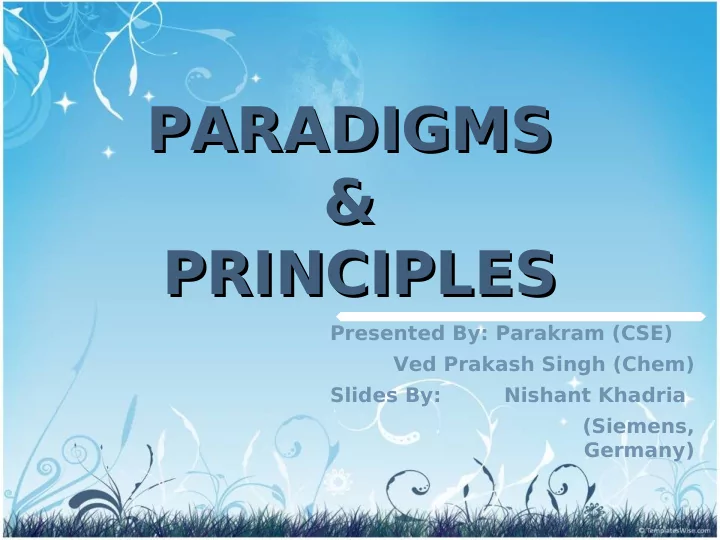

PARADIGMS PARADIGMS & & PRINCIPLES PRINCIPLES Presented By: Parakram (CSE) Ved Prakash Singh (Chem) Slides By: Nishant Khadria (Siemens, Germany)
Overview Case Study #1 Case Study #2 Paradigm – Definition Paradigm - Effects An Exercise Conclusion
Case Study #1 Swiss watch makers 1968 • 80% of global profits, 65% market shares
Case Study #1 Swiss watch makers 1968 80% of global profits, 65% market shares 1978 Shares dropped to 10% 1981 50,000 out of 65,000 work-force disbanded Most of the market share went to Japan (negligible entity in 1968)
Case Study #1 Swiss watch makers 1968 80% of global profits, 65% market shares 1978 Shares dropped to 10% 1981 50,000 out of 65,000 work-force disbanded Most of the market share went to Japan (negligible entity in 1968)
Case Study #1 Swiss watch makers 1968 80% of global profits, 65% market shares 1978 Shares dropped to 10% 1981 50,000 out of 65,000 work-force disbanded Most of the market share went to Japan (negligible entity in 1968) Refused to accept the “change” looming around the idea of “digital” watches Against their success formula! Just too “different” for them to accept
Case Study #2 Chester Carlson
Case Study #2 XEROX Chester Carlson
Case Study #2 XEROX Chester Carlson
Case Study #2 XEROX Chester Carlson
Paradigm Definition Webster’s “A pattern” or “a model” Wordweb “A standard” or “typical example” Our definition Sets of rules and regulations that do two things - Establish boundaries, defining what is important and what is not. - Give a structured approach to solving problems. In a way, paradigms are good. They help us ignore irrelevant data and focus on more important things
Paradigm Effects Blinds us to data Some times psychologically and sometimes even physiologically i.e. they are invisible to us
Paradigm Effects Paradigm Paralysis Night-out Paradigm Godfather Paradigm Jack of all Trades Success Paradigm Why not evaluate ideas ?
Paradigm Effects Paradigm Change A paradigm change reduces all to zero. Isn’t it good to learn the art of beginning from zero. Isn’t it good to learn the art of beginning from zero.
An exercise 1. Think of a problem that has been troubling you 2. Try to find why is it a problem at all i.e. why are you not able to solve it – try to figure out the paradigm in which you are trying to solve it 1. Can the problem become solvable by changing the paradigm? “What is impossible to do today? Can it be done with fundamentals completely changed?”
Conclusion You can choose to see things in two ways
Conclusion Every problem has a backdoor to its solution And these solutions are capable enough to keep a flexible person happy and busy for an entire life time
References [1] Stephen Covey ‘Seven Habits of Highly Effective People’ [2] Joel Barker 'Paradigm Acceptance' (Video)
Recommend
More recommend